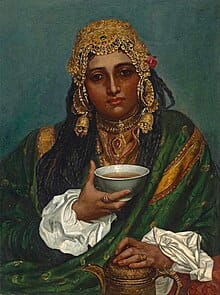Habba Khatoon, often hailed as the “Nightingale of Kashmir,” is a prominent figure in Kashmiri literature and poetry. Born around 1554 in the village of Chandur (also known as Chandrahar) in Pampore, Kashmir, her beauty and poetic talent earned her the affectionate name Zoon, meaning “moon.” From a young age, she exhibited a passion for poetry, learning to read with the help of a local scholar, which set her apart from many of her contemporaries.
Early Life and Marriage
Habba Khatoon’s early life was marked by challenges. Despite her family’s efforts to educate her, they struggled to appreciate her poetic inclinations. She was married off to an illiterate peasant, a union that ultimately failed due to their incompatible lifestyles and her unyielding desire to pursue poetry. Following the breakdown of her marriage, she returned to her parental home, where her poetic voice began to flourish.
Rise to Fame
Her life took a dramatic turn when she caught the attention of Yousuf Shah Chak, the last independent ruler of Kashmir. During a visit to the saffron fields, he was captivated by her enchanting voice and heartfelt songs. Their love blossomed into marriage, and Habba Khatoon became queen, using her influence as an advisor to Yousuf Shah Chak. Together, they represented a unique blend of love and artistry, with Khatoon’s poetry reflecting themes of love, longing, and separation.
The Impact of Political Turmoil
The couple’s happiness was short-lived. In 1579, the Mughal Emperor Akbar invaded Kashmir, leading to Yousuf Shah Chak’s imprisonment. Separated from her husband, Habba Khatoon wandered the valleys of Kashmir, pouring her heart into her poetry. Her verses became a source of solace not only for herself but also for the people suffering under Mughal rule. Her songs expressed deep emotions and resonated with themes of loss and yearning, making them timeless pieces in Kashmiri folk literature.
Legacy and Cultural Significance
Habba Khatoon is credited with introducing the “loal,” a lyrical form that captures brief yet powerful thoughts filled with melody and emotion into Kashmiri poetry. Her candidness and ability to convey profound feelings set her apart from many poets of her time, who often adhered to more spiritual or conventional themes. Although historical records vary regarding the exact number of poems attributed to her—some scholars claim only about twenty—her influence on Kashmiri culture remains undeniable.
Despite her significant contributions, Habba Khatoon’s legacy has faced neglect over the years. Her tomb near Athwajan on the Jammu-Srinagar highway is in disrepair, symbolizing the broader challenges in preserving Kashmir’s cultural heritage. Efforts to commemorate her legacy have been sporadic, including naming an Indian Coast Guard ship after her and producing television adaptations of her life.
Conclusion
Habba Khatoon’s life story is one of resilience and passion for poetry amidst adversity. Her works continue to inspire generations in Kashmir and beyond, reminding us of the power of love and artistic expression in overcoming life’s challenges. As we reflect on her contributions, it is crucial to advocate for the preservation of not only her legacy but also that of other literary figures who have shaped Kashmiri culture. Habba Khatoon’s poetry remains a vital part of Kashmir’s rich tapestry, echoing through time as a testament to the enduring spirit of its people.









